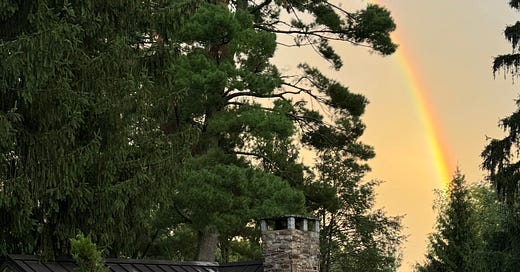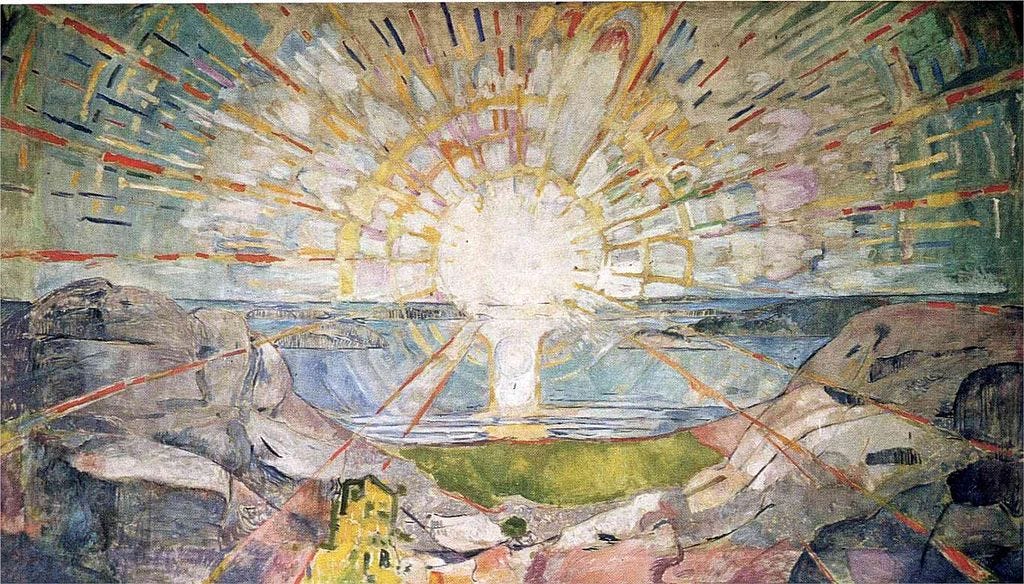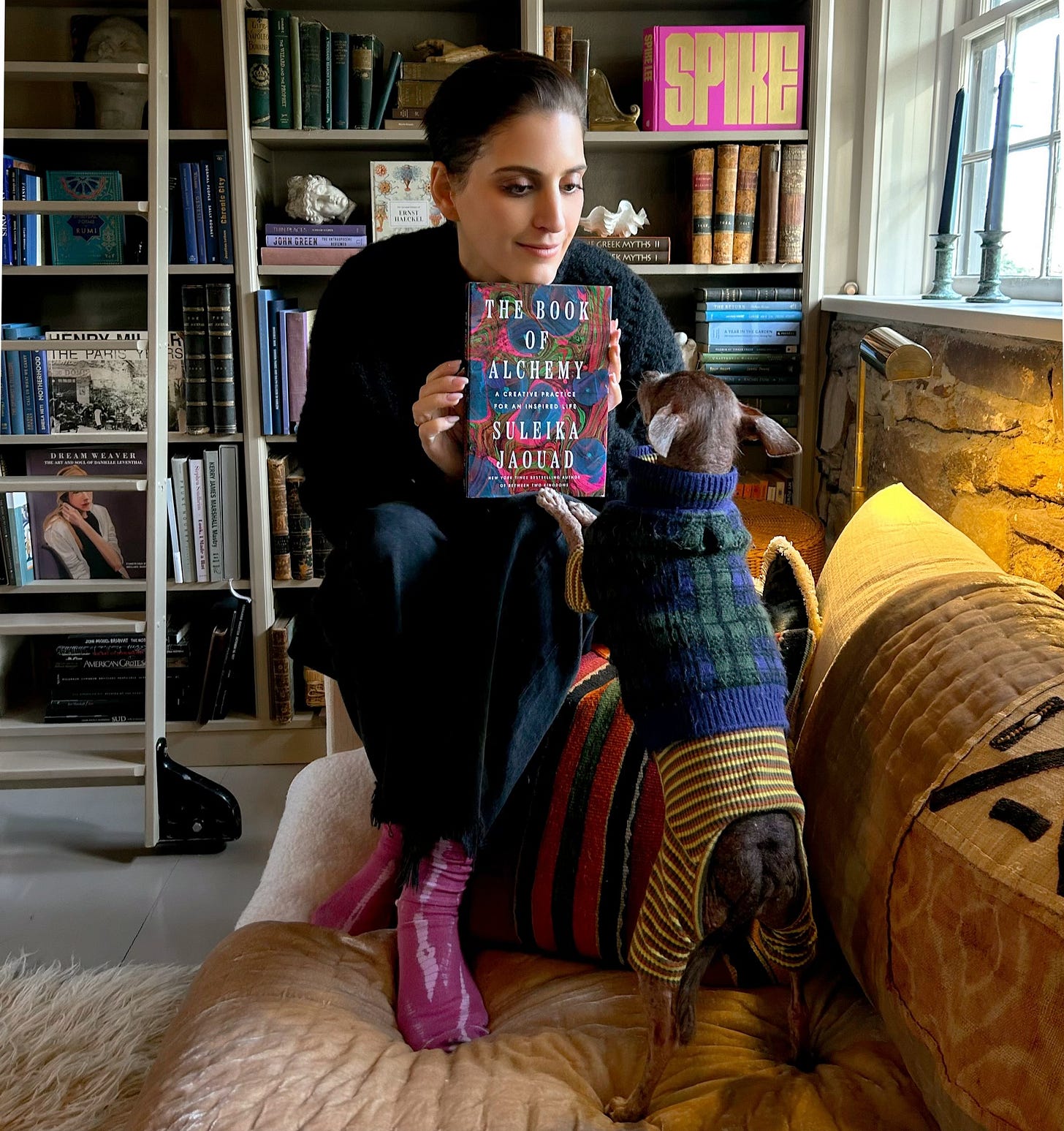Hi friend,
I like it when the weather dictates how I spend my time—when I loiter for an extra hour at the park with the dogs on a sunny day, or when I curl up on the couch during a rainstorm. This week has brought gloomy weather, which I’ve actually been enjoying. It has felt like a little nod from the universe, as I’ve been stuck in bed for much of the week courtesy of chemo, and that’s harder to resign myself to when it’s beautiful out.
Still, I’ve been taking the dogs to the park each morning. It’s my one non-negotiable, the thing that puts me in motion, both physically and mentally. It’s not always easy to get myself out the door, but I’m always glad I did it. I see surprising things or run into interesting people or otherwise feel provoked. This morning it was the sky. Grey and misting, it felt like a mirror of my mood, like I was some broody Romantic poet—like Wordsworth wandering “lonely as a cloud.”
And yet all week, I felt myself longing for the moment when the weather shifts—when the sun finally breaks from behind those clouds, making things warm and bright, lifting me, giving me a jolt of energy. Between the grey sky and the side effects of chemo, I was feeling so uninspired that I wondered if I’d have anything to write about in this newsletter, which almost never happens to me. It was a very strange feeling—getting to newsletter #339 and coming up entirely blank.
But as it happens, on Thursday, I got an email that gave me that jolt. It was an update from a man named Calvin, who has been in prison in Virginia for more than two decades, sent via his attorney. Calvin first wrote to me this way in 2023. At the time, I was penning an advice column called Dear Susu, and he asked this question: “I’ve been too ashamed and embarrassed to write about my upbringing, things that happened with my family, and the things I’ve done. So I guess the question I have for you is how do I get out of my own way, so I can write what needs to be written most?”
It’s a big question, one that often takes years of reflection and hard work to answer, but what I shared with him is the place I think it begins: “Sharing our stories requires us to believe that we won’t be rejected for them—to believe that when we reveal our whole selves, including the parts we aren’t proud of, we won’t be seen as undeserving of acceptance or love.”
In his update, Calvin thanked me for the advice on writing memoir. Then he told me many people in the Isolation Journals community had written him letters—more mail than he’d ever gotten in his life—and “it was all love too,” he wrote. “That was the beautiful thing about it.” Every single person told him something inspirational and encouraging, sincerely wishing him a better future. He said one woman from the UK wrote to give him advice about writing, but insisted he didn’t need to write her back because she was terminally ill. “I think of her sometimes,” Calvin wrote. “I wonder if I were in her shoes, would I have had the presence of mind to write to someone the way she wrote to me?” He mused at the remarkable way love and friendship can translate, even through prison walls.
Earlier this week, on one of those gloomy days, I picked up a book from my desk. It’s a new collection of poems called Water by Rumi, translated by Haleh Liza Gafori. (You may recall that we featured selections from her earlier translation, Gold, in our 2024 New Year’s journaling challenge. Haleh says Water is Gold’s “moody cousin.”) I opened it to a poem that begins, “Sun in the heart, sun in the soul,/ fill the house with light again.” I wondered, “Where is the sun?” And then it appeared in the form of a letter from Calvin. Such is the power of words, drawing us in, connecting us.
Now it’s my great honor to introduce today’s guest contributor—the poet Rumi via the fresh and faithful translations of Haleh Liza Gafori. Below you’ll find that poem, “Sun in the heart, sun in the soul,” and a prompt inspired by it. May it be a light.
Suleika
P.S. I want to share one more thing I learned through Calvin’s attorney when I asked permission to share a snippet of his letter with you today—that he once opened a letter to her with, “I pray the sun is shining exceptionally bright upon you when this letter is received.” I pray the same.
Some Items of Note—
Our next meeting of the Hatch, our virtual creative hour for paid subscribers, is happening today—that’s Sunday, May 25 from 1-2 pm ET. Carmen Radley will be hosting, reading a passage from Samantha Harvey’s novel Orbital and reflecting on the idea of a home away from home. Find everything you need to join us here!
There’s a very limited quantity of Alchemy Tour merch left—the silk scarf and baseball cap sold out, but the Wonder sweatshirt and the Book of Alchemy tote are still available. Get yours here!
Prompt 339. Sun in the Heart, Sun in the Soul by Rumi
from Water, translated by Haleh Liza Gafori
Sun in the heart, sun in the soul, fill the house with light again. Fill our friends with joy. Blaze in the eyes of enemies. Blind them till they see. Rise over the mountain. Ripen the grapes. Make rubies out of stones. Sun in the sky, sun in the heart, doctor, beacon, take our hands. Use our hands. Cure the ill and ailing. Make the gardens green again, adorn farm and meadow with every fruit and flower. Criminal to let clouds hide you. Unveil your face and brighten our dim world.
Your prompt for the week:
Write about the sun. About a moment big or small when it unveiled its face, either literally or metaphorically.
Today’s Contributor—
Rumi, Molana, Jalāl ad-Dīn Mohammad Balkhy (1207–1273), was born in or near the city of Balkh, in present-day Afghanistan. Considered the greatest poet of the Persian language, Rumi’s major works are the Masnavi, a six-volume collection of mystical teachings in rhyming couplets, and the Divan-e Shams-e Tabrizi, a collection of lyric poetry dedicated to his spiritual mentor. He died and was buried in Konya.
Haleh Liza Gafori is a translator, poet, vocalist, and performance artist of Persian descent born in New York City. She has translated two books of poetry by Rumi—first Gold in 2022, followed by Water in 2025. A 2024 MacDowell fellow, she has been published by Columbia University Press, Literary Hub, Harvard Review, and The Brooklyn Rail, among others, and performs and lectures at universities and venues across the country.
How are you approaching The Book of Alchemy?
I’ve gotten notes from so many of you who are making your way through The Book of Alchemy, and I never get tired of them! I especially love hearing the different ways you’re approaching the book. Below are a sampling of a few that made my week:
“Thank you for putting The Book of Alchemy out into the world. I am savoring it one gift of story at a time.” —Dianne
“I am in the middle of the book and fully immersed! Next read through, I’ll write from the prompts.” —Eve
“I’m listening to The Book of Alchemy and I’m in awe! You move me to tears with your raw honesty and kind heart!” —Lisa
“When my book arrived, I was so excited and wanted to begin my 100-day journaling journey immediately—but I didn’t want to do it alone. So I took a chance and texted five friends to ask if they’d like to join me. Then two more friends heard about it, and now there are eight of us, six in Massachusetts, one in Minnesota, and one in Ireland! —Susan
If you’ve got your own tack, and especially if you’re reading the book with friends, family, a book club, or some other group, I’d love to hear about it!












I’ve never shared here. The sun is my gift every morning. Here is my writing…
The Rise
Ribbon of red across the dawn, like God’s smile of good morning.
You remind me that I am loved.
You prove there is a fresh start I can enjoy each day,
If only I recognize it.
Ribbon of red across the dawn does not seem like a sailor’s warning.
More so the joyful dance of clouds
And the joyful songs of birds who
Delight in your sight
As much as I do.
I lost my son in Afghanistan 15 years ago. He was 25. Every morning I imagine him enjoying the sunrise with me from his vantage point. Peace to all
This silently thunderous piece, Suleika, I feel I’m reading the meteorology of your soul on the one hand, and a dispatch from the heart’s war front, on the other. Letting the weather be your co-conspirator in survival can be beautifully subversive. It reminds me of how Virginia Woolf once described moments of being, those rare flickers when life aligns, just for a second, and something invisible yet essential breaks through the fog. You’ve captured that here, with the sky as your mirror and Calvin’s letter as your sunburst.
I love your ritual with the dogs. It might be seen as routine, but for me it’s a form of résistance. A bit like tending to a small garden in a war zone, not out of naïveté but out of defiance. As if to say, yes, I’ll still meet the morning, still greet the world, even if it comes cloaked in mist.
“Sharing our stories requires us to believe that we won’t be rejected for them” feels like the quiet thesis of everything good. What you describe reminds me more of palimpsests, the ancient manuscripts that were written over, their original texts scraped away, only to resurface centuries later under ultraviolet light. The beauty of a palimpsest is not in its clarity but in its layering, the ghost of the old text still breathing beneath the new. That’s how your work with Calvin feels. That’s how you feel in this piece. The weather, the chemo, the creative drought…. they are sedimentary layers. Each one leaves a trace. And somehow, even in your blankness, something essential is speaking.
There’s also something powerful for me in how you’ve mirrored his isolation with your own, his cell, your sickbed, both permeable to love in surprising ways. Perhaps the greatest fiction of our time is that we must be “productive” to be radiant. Yet here you are, proving the opposite: that presence, attention, and open-heartedness, especially in difficulty, can be the brightest sun of all.
May it continue to shine exceptionally bright upon you, Suleika!